Resume
Telemtetry Nurse Cover Letter Examples

May 29, 2025
|
12 min read
Craft a standout telemetry nurse cover letter to monitor your career aspirations and boost your job prospects. Learn crucial tips to perfect your communication, connecting you to success in a heartbeat.
4.70 Average rating
Rated by 348 people
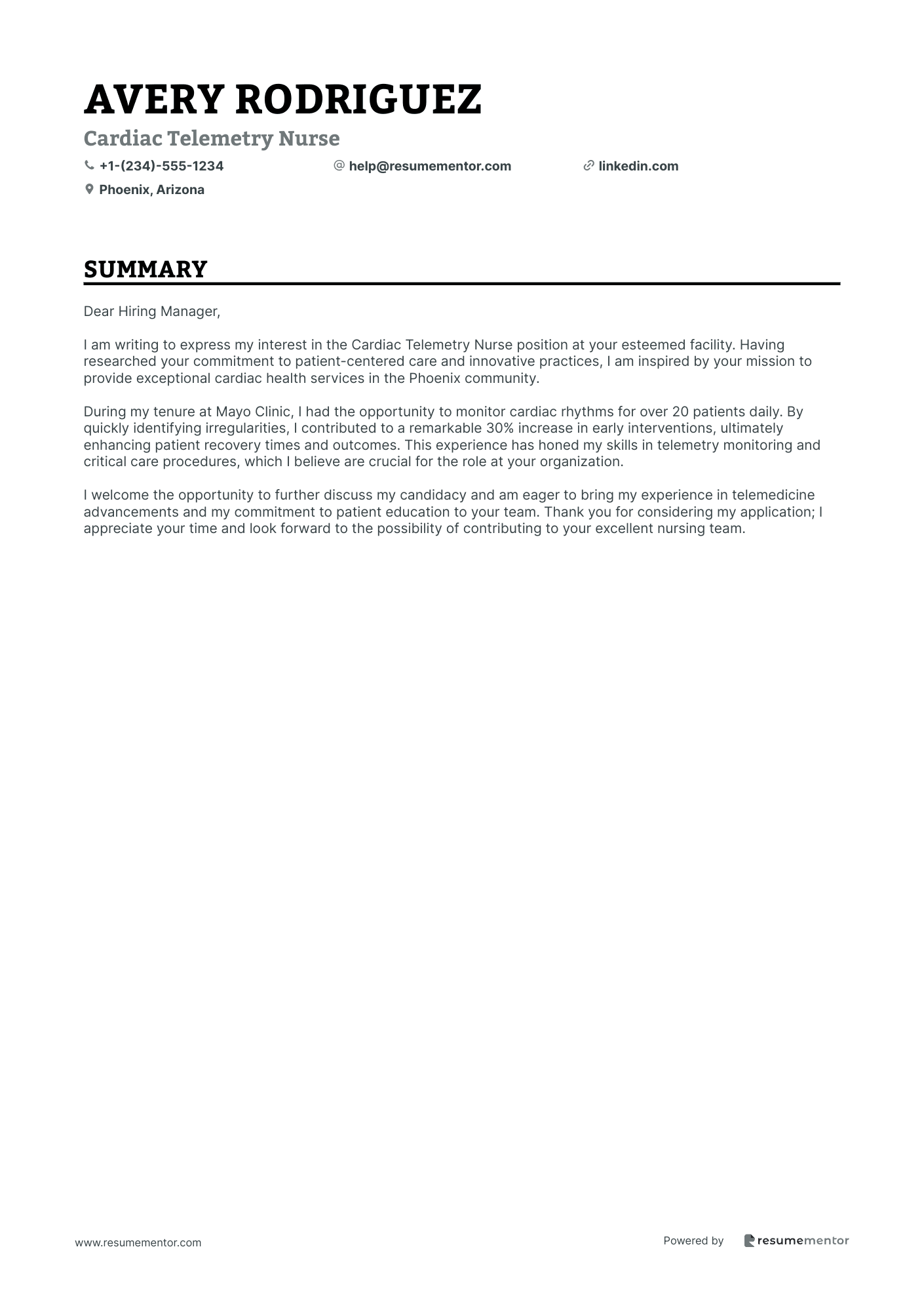
Cardiac Telemetry Nurse
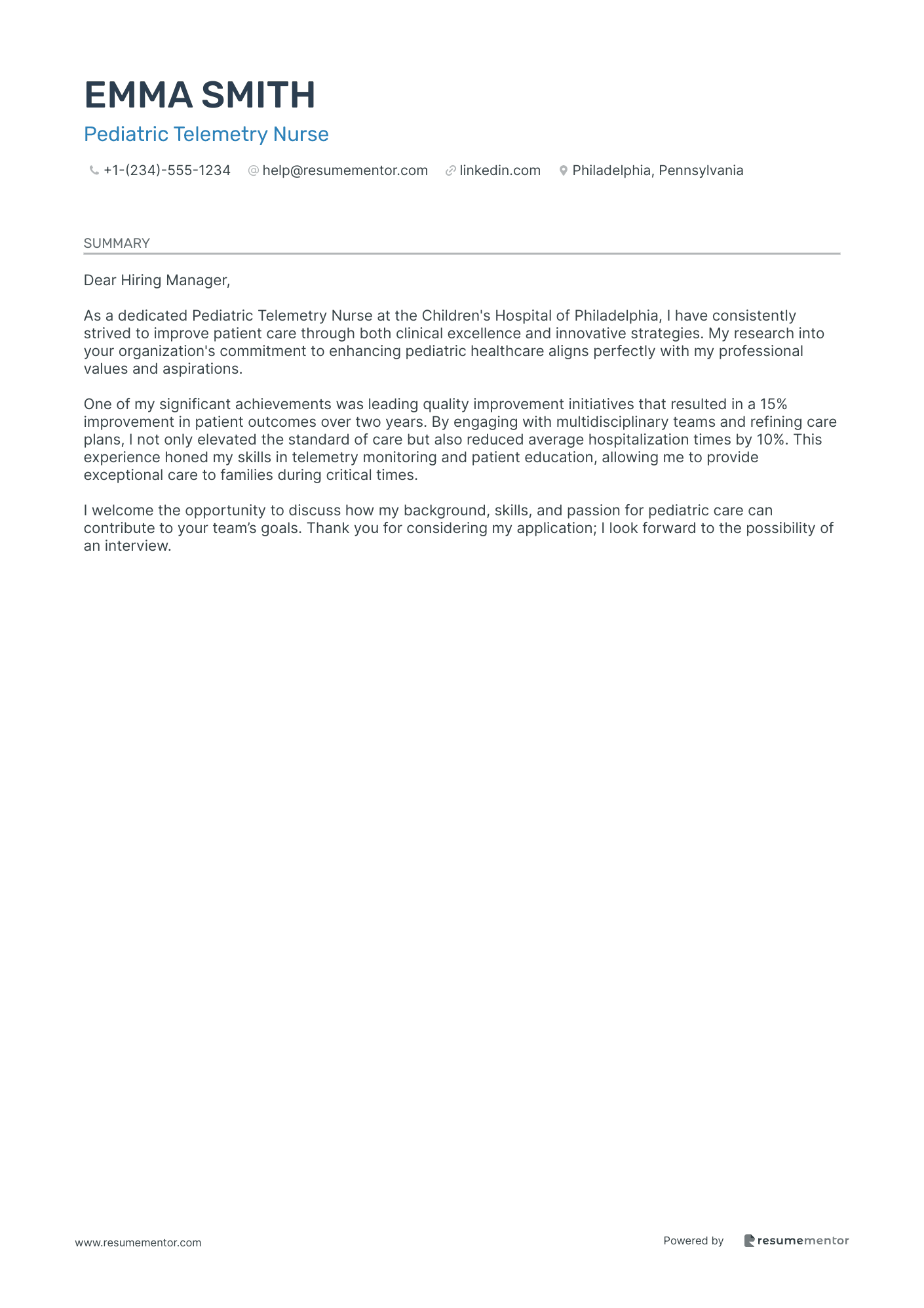
Pediatric Telemetry Nurse
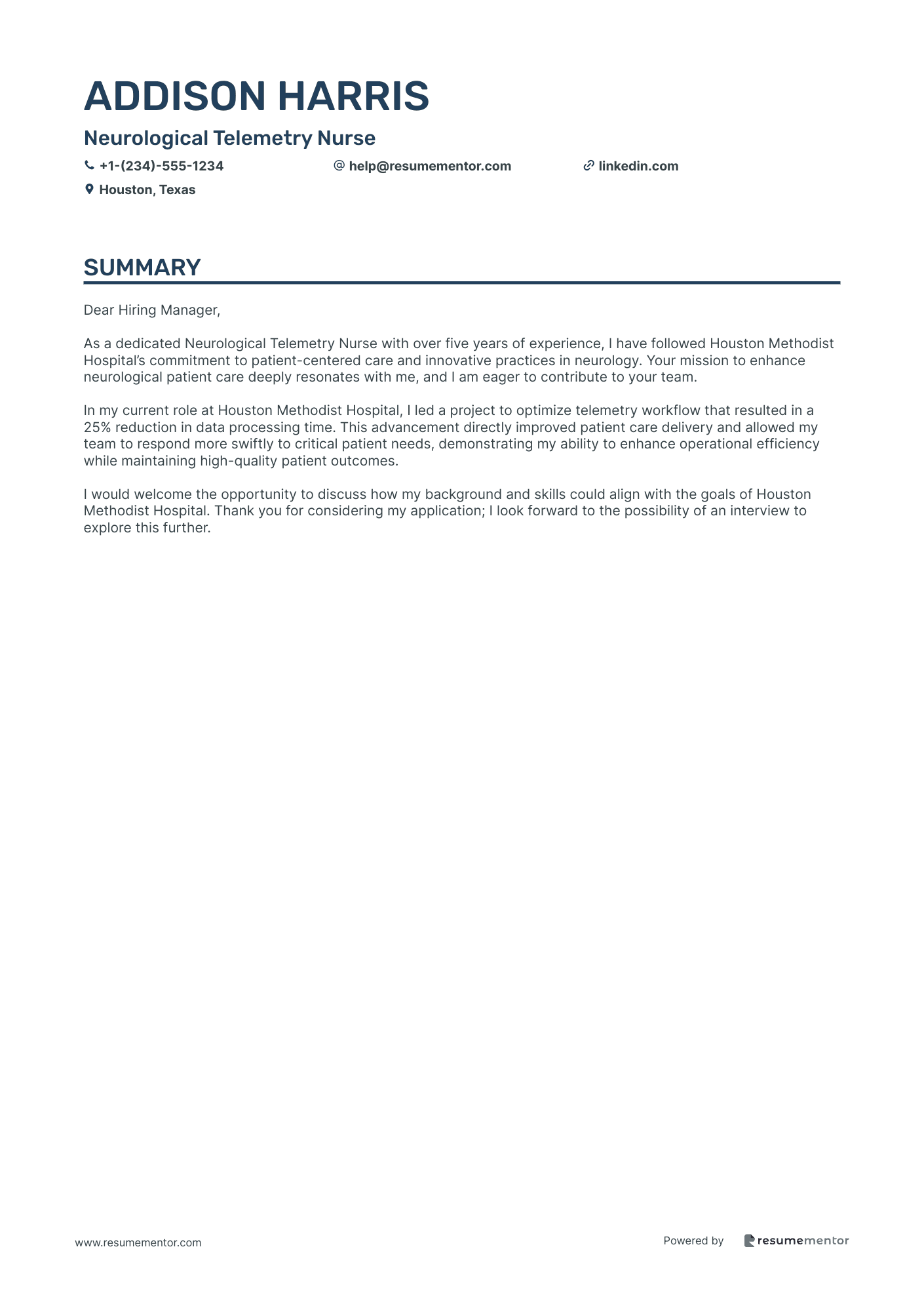
Neurological Telemetry Nurse
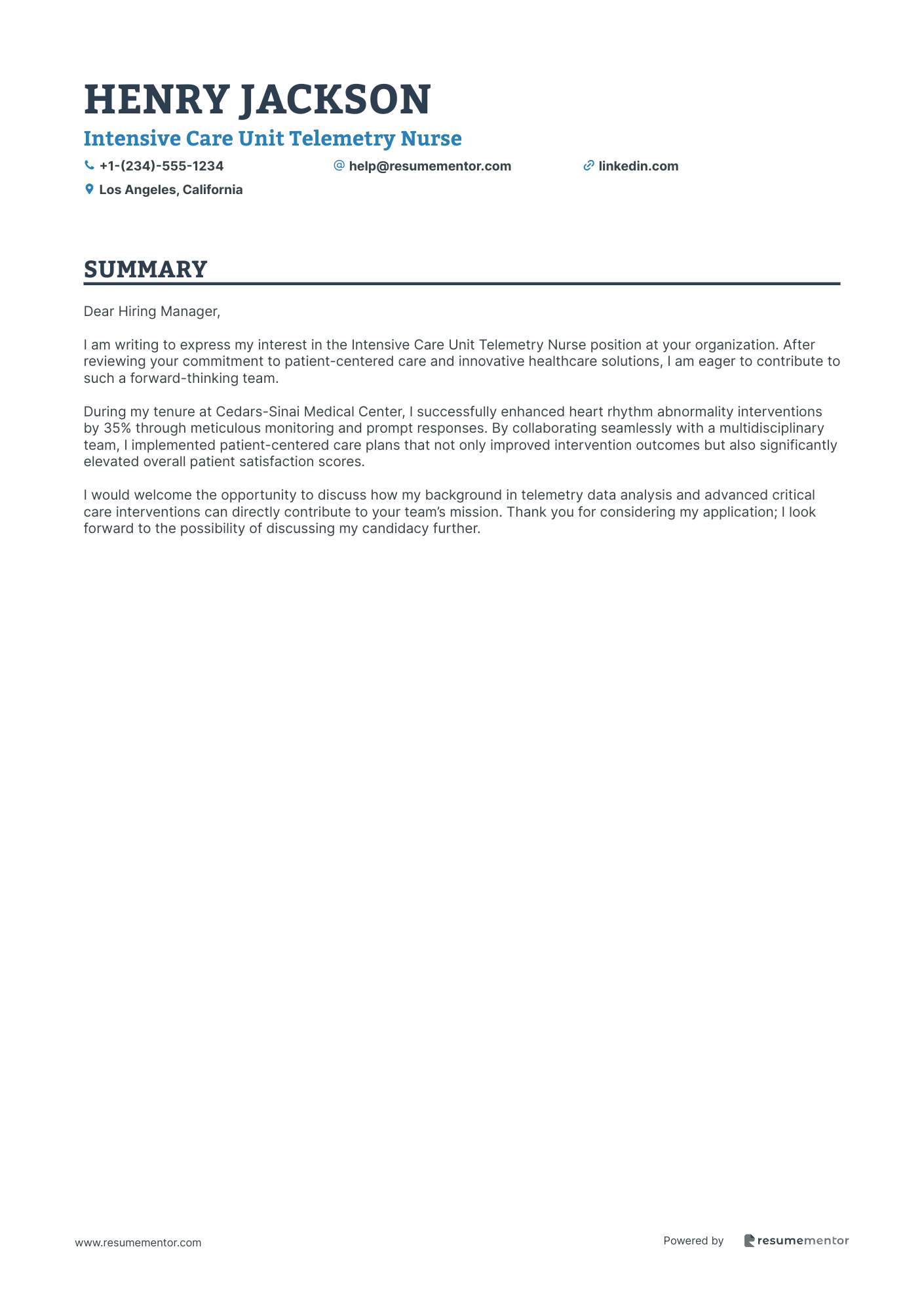
Intensive Care Unit Telemetry Nurse
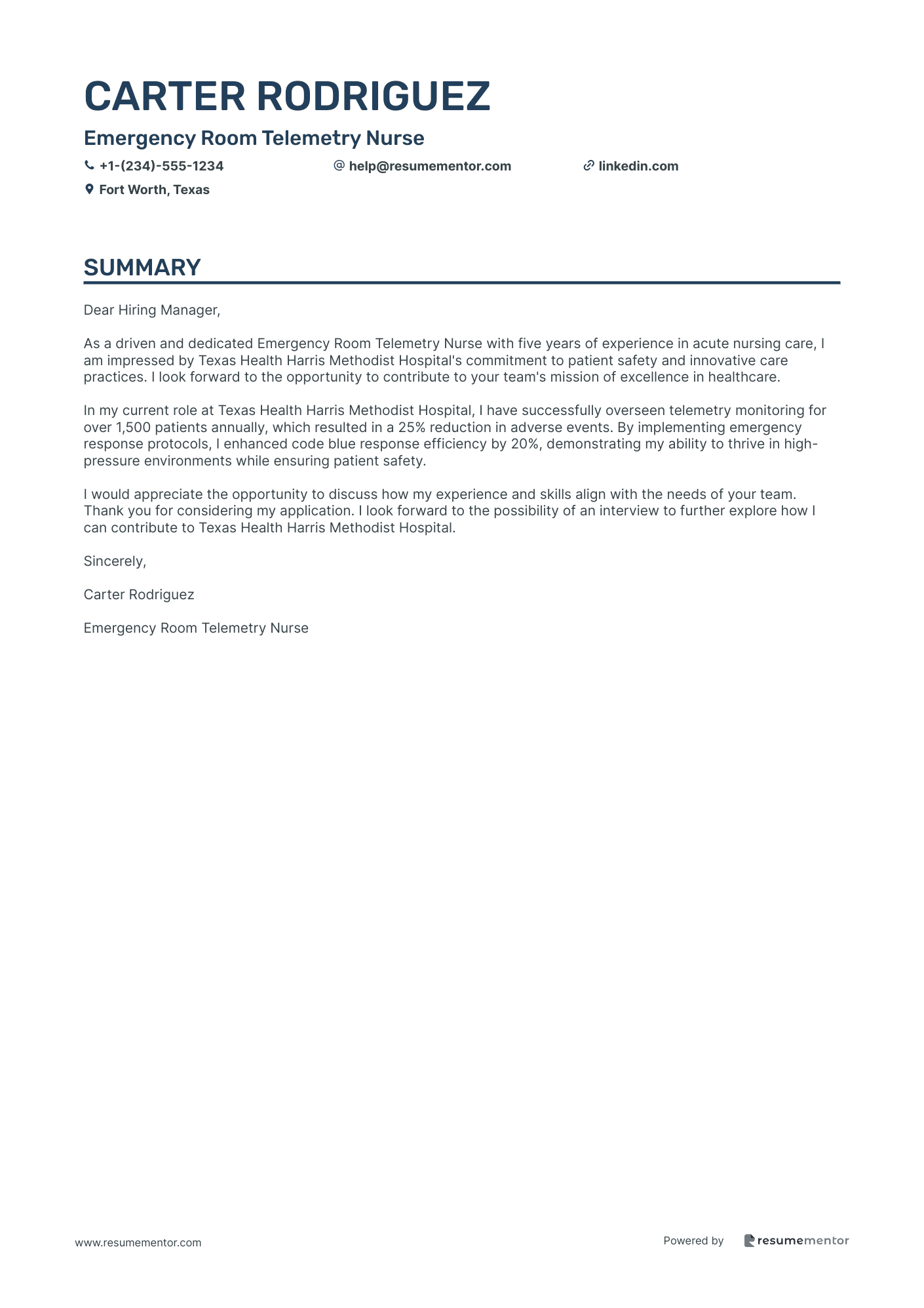
Emergency Room Telemetry Nurse
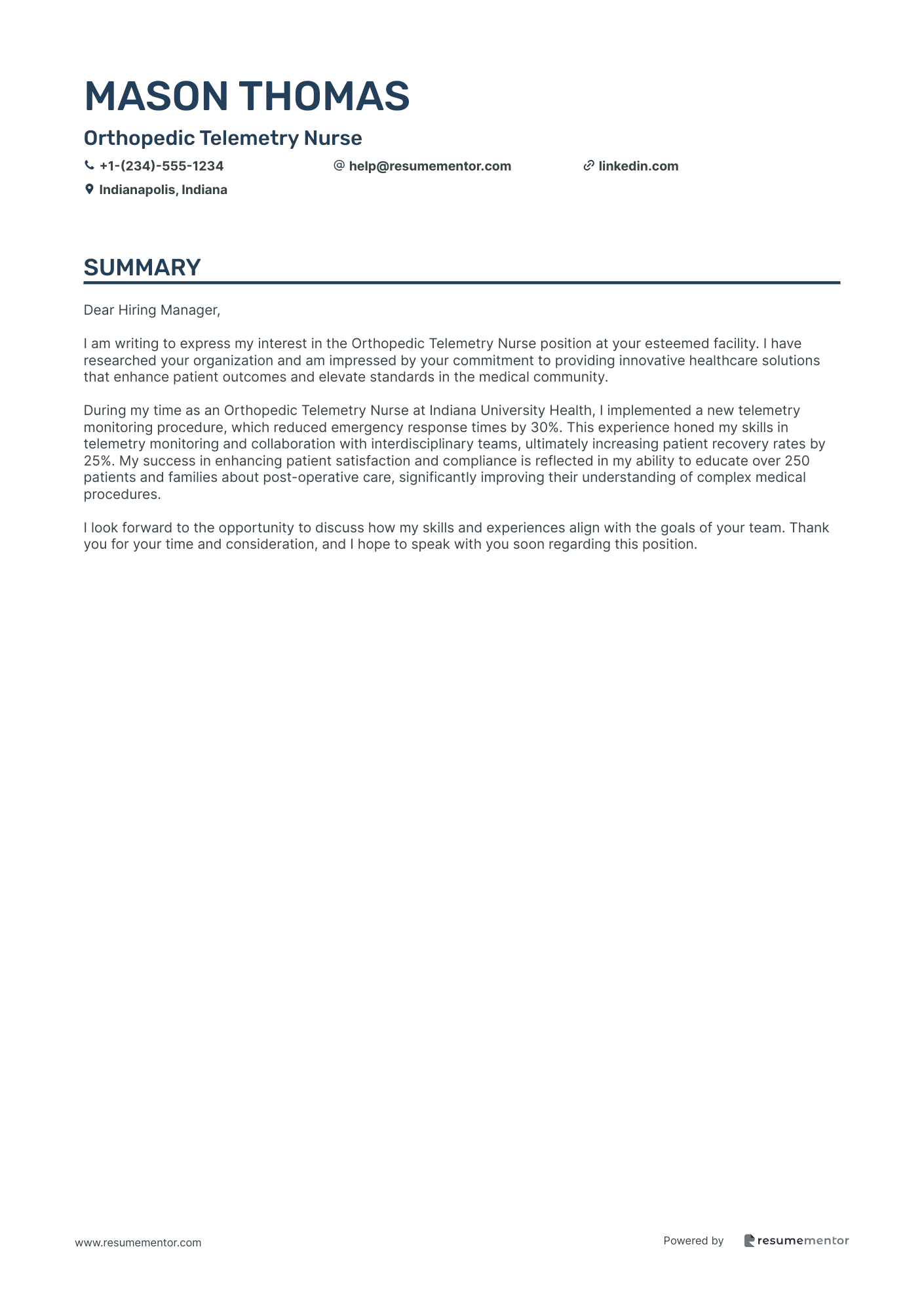
Orthopedic Telemetry Nurse
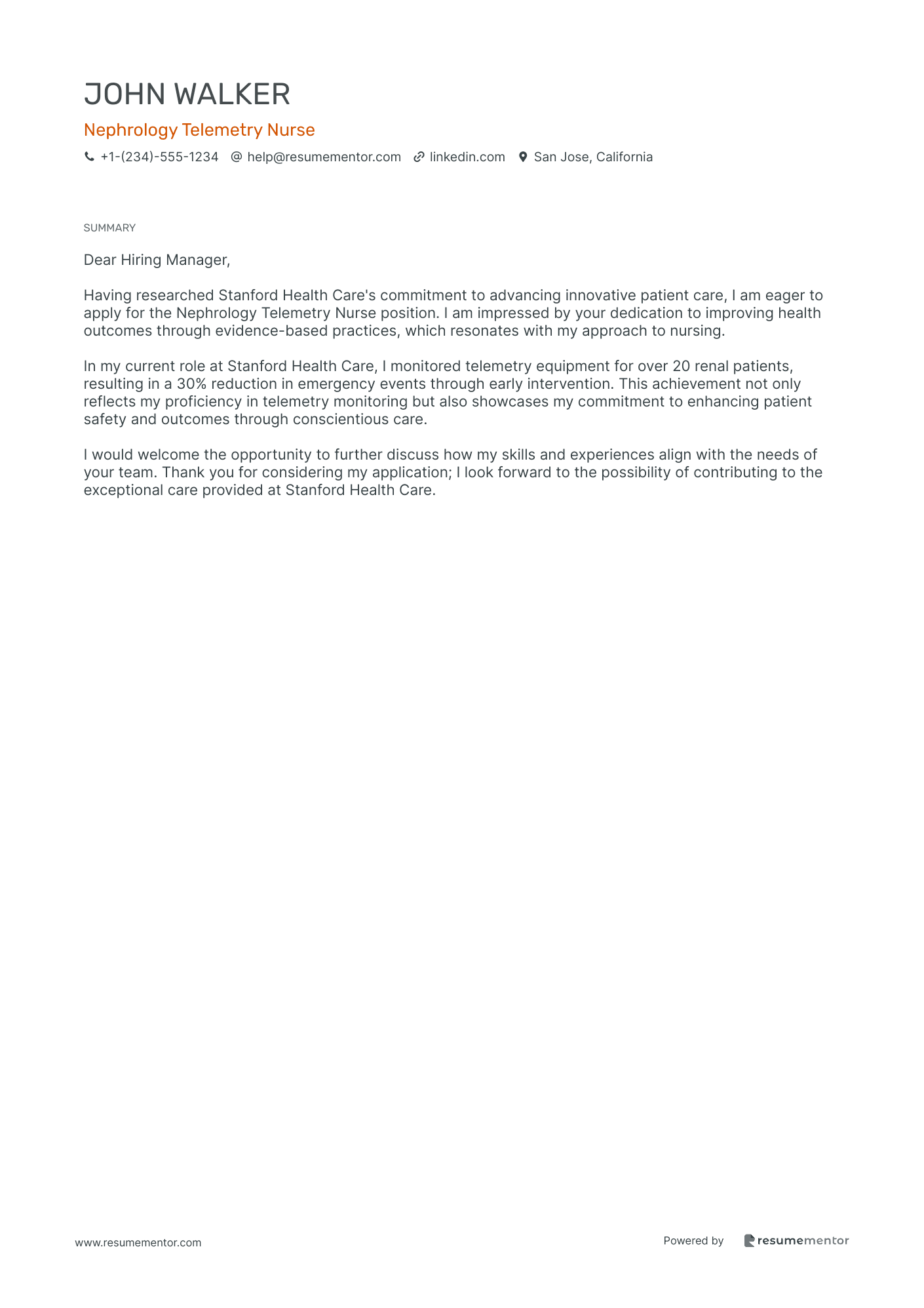
Nephrology Telemetry Nurse
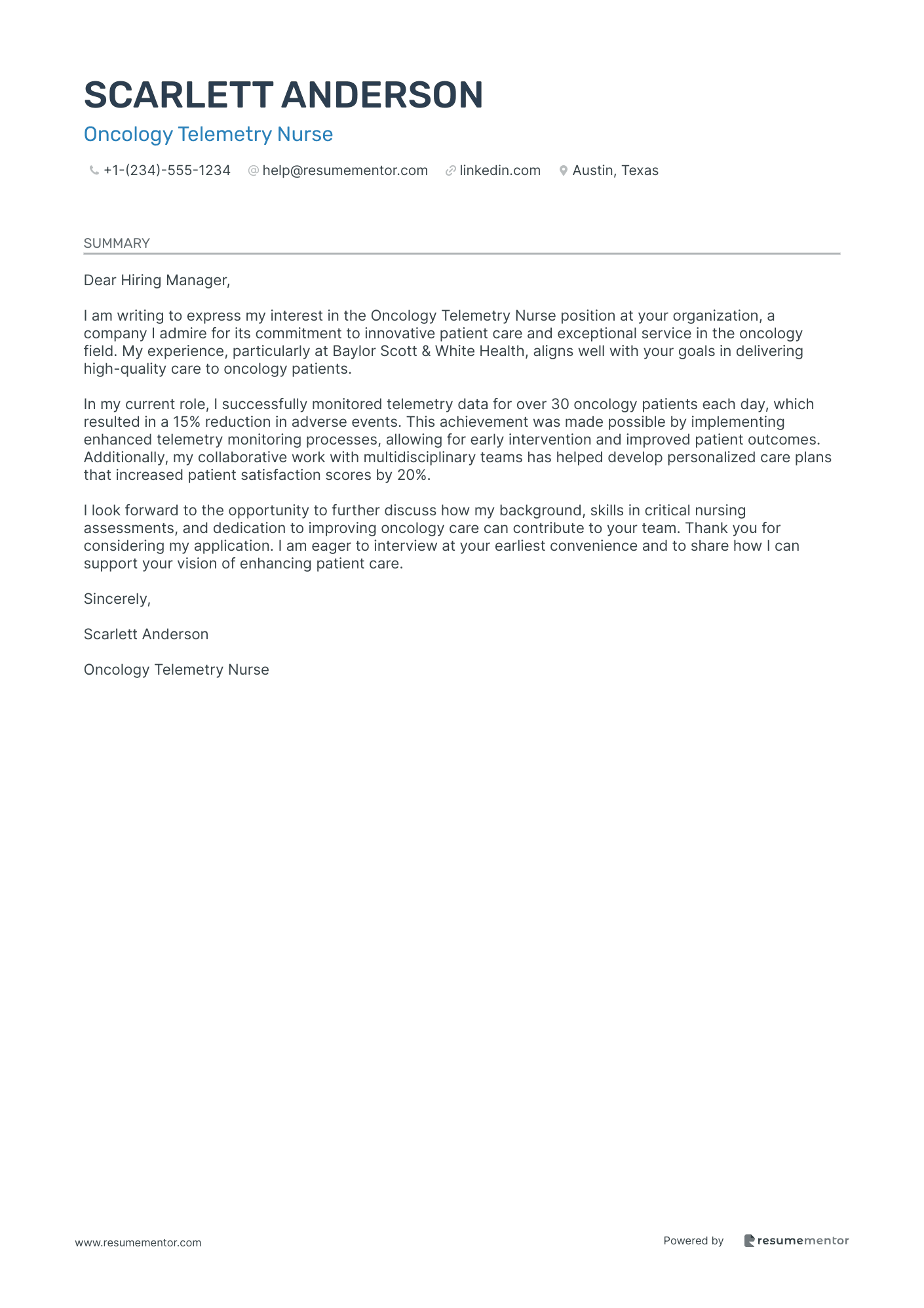
Oncology Telemetry Nurse
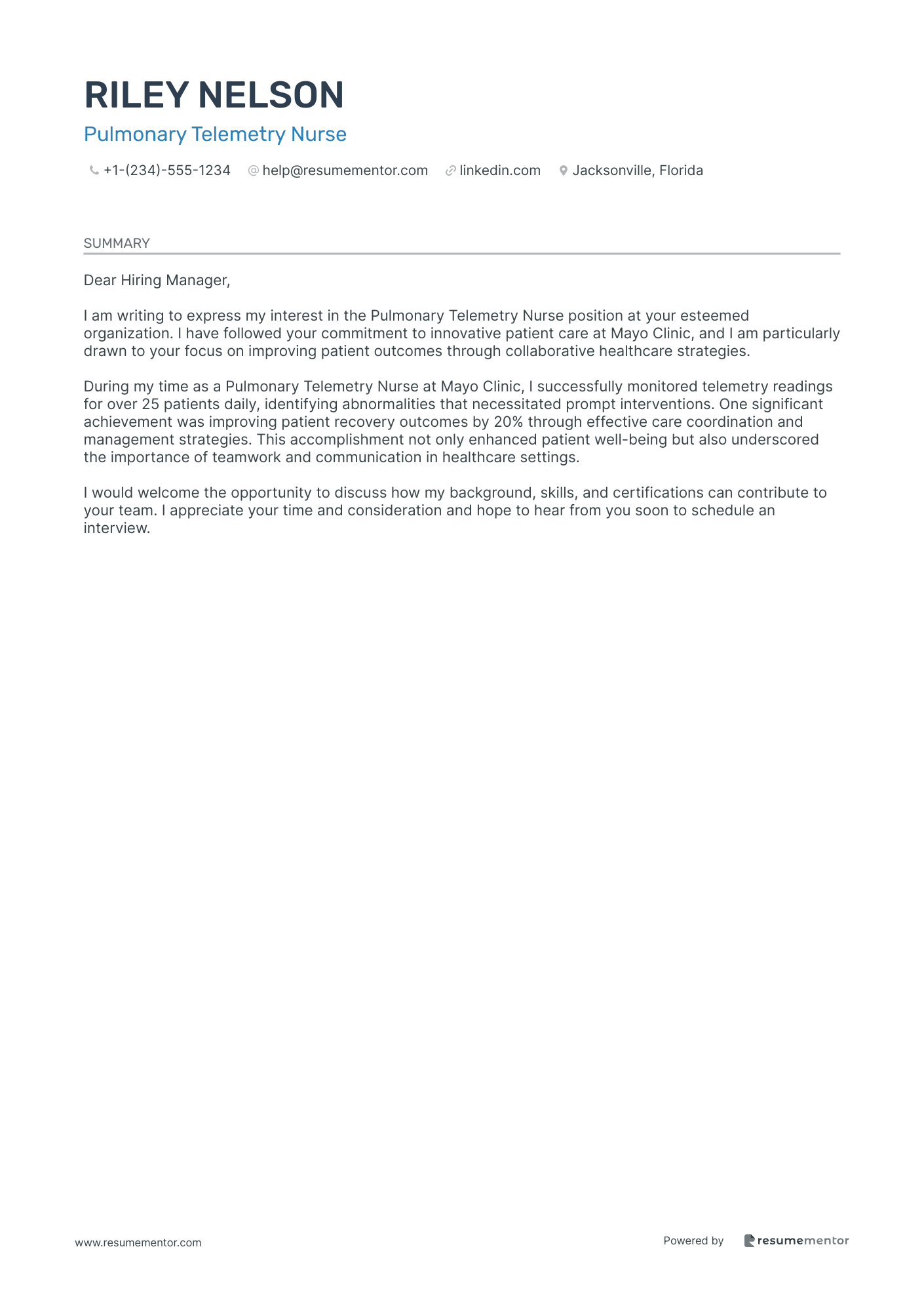
Pulmonary Telemetry Nurse
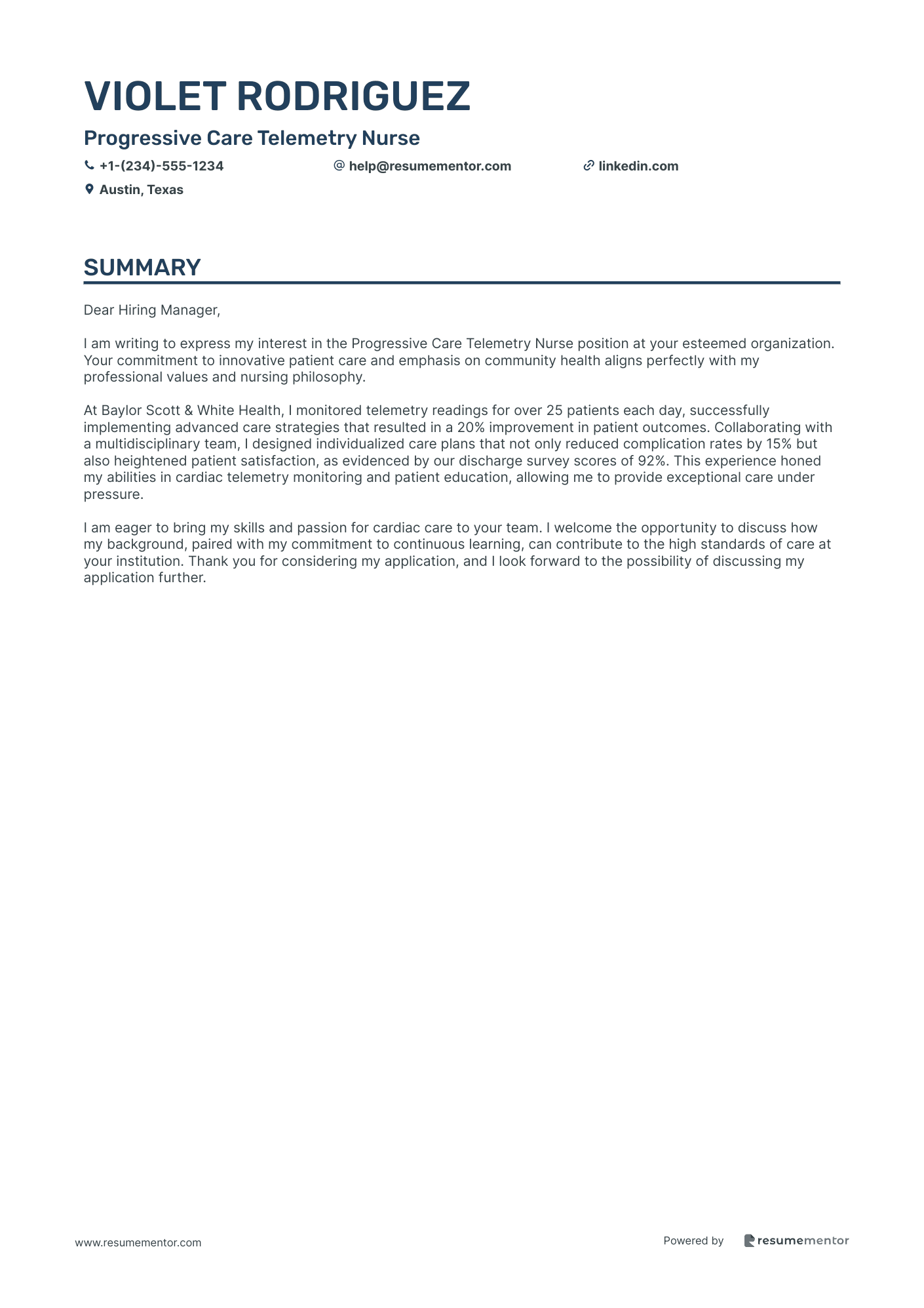
Progressive Care Telemetry Nurse

Cardiac Telemetry Nurse cover letter sample
When applying for this role, it’s essential to highlight any experience in critical care or telemetry nursing. Focus on your ability to monitor patients’ vital signs and recognize arrhythmias. Showcase your proficiency with advanced cardiac life support (ACLS) and highlight any additional certifications, such as telemetry training courses. Include specific examples of how you have improved patient outcomes or streamlined processes in previous positions. Use clear metrics or results where possible, demonstrating your impact on patient care and team collaboration.
Avery Rodriguez
Cardiac Telemetry Nurse
Summary
Dear Hiring Manager,
I am writing to express my interest in the Cardiac Telemetry Nurse position at your esteemed facility. Having researched your commitment to patient-centered care and innovative practices, I am inspired by your mission to provide exceptional cardiac health services in the Phoenix community.
During my tenure at Mayo Clinic, I had the opportunity to monitor cardiac rhythms for over 20 patients daily. By quickly identifying irregularities, I contributed to a remarkable 30% increase in early interventions, ultimately enhancing patient recovery times and outcomes. This experience has honed my skills in telemetry monitoring and critical care procedures, which I believe are crucial for the role at your organization.
I welcome the opportunity to further discuss my candidacy and am eager to bring my experience in telemedicine advancements and my commitment to patient education to your team. Thank you for considering my application; I appreciate your time and look forward to the possibility of contributing to your excellent nursing team.
Pediatric Telemetry Nurse cover letter sample
When applying for this role, be sure to underscore your clinical experience in pediatrics and any telemetry-specific training. Highlight your ability to monitor vital signs and recognize changes in patients' conditions promptly. Mention certifications like BLS or PALS, emphasizing their relevance to patient care. Use specific examples to show how your interventions influenced patient outcomes positively. Discuss teamwork and communication skills, detailing situations where collaboration with physicians or families improved care. Following a 'skill-action-result' format can enhance the impact of your achievements on the cover letter.
Emma Smith
Pediatric Telemetry Nurse
Summary
Dear Hiring Manager,
As a dedicated Pediatric Telemetry Nurse at the Children's Hospital of Philadelphia, I have consistently strived to improve patient care through both clinical excellence and innovative strategies. My research into your organization's commitment to enhancing pediatric healthcare aligns perfectly with my professional values and aspirations.
One of my significant achievements was leading quality improvement initiatives that resulted in a 15% improvement in patient outcomes over two years. By engaging with multidisciplinary teams and refining care plans, I not only elevated the standard of care but also reduced average hospitalization times by 10%. This experience honed my skills in telemetry monitoring and patient education, allowing me to provide exceptional care to families during critical times.
I welcome the opportunity to discuss how my background, skills, and passion for pediatric care can contribute to your team’s goals. Thank you for considering my application; I look forward to the possibility of an interview.
Neurological Telemetry Nurse cover letter sample
When applying for this position, emphasize any experience in telemetry monitoring or neurological care. Highlight your proficiency in interpreting EEGs and understanding neurological disorders. Include certifications, such as Basic Life Support (BLS) or Advanced Cardiovascular Life Support (ACLS), to show your commitment to patient care. Provide examples of how your quick decision-making and attention to detail have improved patient outcomes. Use the 'skill-action-result' approach to demonstrate how your clinical skills have directly benefitted patients and contributed positively to your previous healthcare teams.
Addison Harris
Neurological Telemetry Nurse
Summary
Dear Hiring Manager,
As a dedicated Neurological Telemetry Nurse with over five years of experience, I have followed Houston Methodist Hospital’s commitment to patient-centered care and innovative practices in neurology. Your mission to enhance neurological patient care deeply resonates with me, and I am eager to contribute to your team.
In my current role at Houston Methodist Hospital, I led a project to optimize telemetry workflow that resulted in a 25% reduction in data processing time. This advancement directly improved patient care delivery and allowed my team to respond more swiftly to critical patient needs, demonstrating my ability to enhance operational efficiency while maintaining high-quality patient outcomes.
I would welcome the opportunity to discuss how my background and skills could align with the goals of Houston Methodist Hospital. Thank you for considering my application; I look forward to the possibility of an interview to explore this further.
Intensive Care Unit Telemetry Nurse cover letter sample
When applying for this position, it's important to highlight your clinical experience in critical care settings. Emphasize any certifications, such as BLS or ACLS, and ensure you mention the duration of your training to demonstrate your expertise. Showcase your ability to monitor patients using telemetry equipment and respond to alarms swiftly. Include specific instances where your quick decision-making improved patient outcomes. Use a 'skill-action-result' framework to illustrate how your nursing interventions have positively impacted patient recovery and team efficiency.
Henry Jackson
Intensive Care Unit Telemetry Nurse
Summary
Dear Hiring Manager,
I am writing to express my interest in the Intensive Care Unit Telemetry Nurse position at your organization. After reviewing your commitment to patient-centered care and innovative healthcare solutions, I am eager to contribute to such a forward-thinking team.
During my tenure at Cedars-Sinai Medical Center, I successfully enhanced heart rhythm abnormality interventions by 35% through meticulous monitoring and prompt responses. By collaborating seamlessly with a multidisciplinary team, I implemented patient-centered care plans that not only improved intervention outcomes but also significantly elevated overall patient satisfaction scores.
I would welcome the opportunity to discuss how my background in telemetry data analysis and advanced critical care interventions can directly contribute to your team’s mission. Thank you for considering my application; I look forward to the possibility of discussing my candidacy further.
Emergency Room Telemetry Nurse cover letter sample
When crafting your cover letter, it’s important to highlight any previous experience in critical care settings. Emphasize your proficiency with monitoring equipment and software, as well as your ability to react quickly to patient changes. Showcase your certifications, such as ACLS or BLS, and mention any specialized training. Provide examples of how your quick assessments have improved patient outcomes or enhanced team efficiency. Use the 'skill-action-result' framework to illustrate your impact on patient care and safety in high-pressure environments.
Carter Rodriguez
Emergency Room Telemetry Nurse
Summary
Dear Hiring Manager,
As a driven and dedicated Emergency Room Telemetry Nurse with five years of experience in acute nursing care, I am impressed by Texas Health Harris Methodist Hospital's commitment to patient safety and innovative care practices. I look forward to the opportunity to contribute to your team's mission of excellence in healthcare.
In my current role at Texas Health Harris Methodist Hospital, I have successfully overseen telemetry monitoring for over 1,500 patients annually, which resulted in a 25% reduction in adverse events. By implementing emergency response protocols, I enhanced code blue response efficiency by 20%, demonstrating my ability to thrive in high-pressure environments while ensuring patient safety.
I would appreciate the opportunity to discuss how my experience and skills align with the needs of your team. Thank you for considering my application. I look forward to the possibility of an interview to further explore how I can contribute to Texas Health Harris Methodist Hospital.
Sincerely,
Carter Rodriguez
Emergency Room Telemetry Nurse
Orthopedic Telemetry Nurse cover letter sample
When applying for this role, it's important to highlight any experience in critical care or telemetry nursing. Emphasize your ability to monitor vital signs and interpret telemetry readings effectively. Certifications such as ACLS or PALS should be prominently featured. Demonstrate your skills by providing specific examples of how you have responded to patient needs in a fast-paced environment. Use a 'situation-task-action-result' format to share how your interventions led to improved patient outcomes or enhanced team collaboration.
Mason Thomas
Orthopedic Telemetry Nurse
Summary
Dear Hiring Manager,
I am writing to express my interest in the Orthopedic Telemetry Nurse position at your esteemed facility. I have researched your organization and am impressed by your commitment to providing innovative healthcare solutions that enhance patient outcomes and elevate standards in the medical community.
During my time as an Orthopedic Telemetry Nurse at Indiana University Health, I implemented a new telemetry monitoring procedure, which reduced emergency response times by 30%. This experience honed my skills in telemetry monitoring and collaboration with interdisciplinary teams, ultimately increasing patient recovery rates by 25%. My success in enhancing patient satisfaction and compliance is reflected in my ability to educate over 250 patients and families about post-operative care, significantly improving their understanding of complex medical procedures.
I look forward to the opportunity to discuss how my skills and experiences align with the goals of your team. Thank you for your time and consideration, and I hope to speak with you soon regarding this position.
Nephrology Telemetry Nurse cover letter sample
When crafting your cover letter, highlight any experience in critical care or telemetry nursing. Detail your familiarity with cardiac monitoring and the nuances of nephrology care. Strong interpersonal skills are essential, so share examples of how you've effectively communicated with both patients and interdisciplinary teams. If you have certifications like Advanced Cardiac Life Support or relevant continuing education, mention these qualifications. Additionally, illustrate how your quick decision-making skills have positively impacted patient outcomes, using the 'skill-action-result' framework to showcase your contributions.
John Walker
Nephrology Telemetry Nurse
Summary
Dear Hiring Manager,
Having researched Stanford Health Care's commitment to advancing innovative patient care, I am eager to apply for the Nephrology Telemetry Nurse position. I am impressed by your dedication to improving health outcomes through evidence-based practices, which resonates with my approach to nursing.
In my current role at Stanford Health Care, I monitored telemetry equipment for over 20 renal patients, resulting in a 30% reduction in emergency events through early intervention. This achievement not only reflects my proficiency in telemetry monitoring but also showcases my commitment to enhancing patient safety and outcomes through conscientious care.
I would welcome the opportunity to further discuss how my skills and experiences align with the needs of your team. Thank you for considering my application; I look forward to the possibility of contributing to the exceptional care provided at Stanford Health Care.
Oncology Telemetry Nurse cover letter sample
When crafting your cover letter, emphasize your clinical experience in oncology settings. Highlight any specific certifications like Basic Life Support (BLS) or Oncology Certification from the Oncology Nursing Certification Corporation. Detail your skills in patient assessment and telemetry monitoring. Include examples of how you have effectively communicated with multidisciplinary teams or improved patient outcomes using evidence-based practices. Use a 'skill-action-result' approach to showcase how your interventions led to enhanced patient care or streamlined workflow in your previous roles.
Scarlett Anderson
Oncology Telemetry Nurse
Summary
Dear Hiring Manager,
I am writing to express my interest in the Oncology Telemetry Nurse position at your organization, a company I admire for its commitment to innovative patient care and exceptional service in the oncology field. My experience, particularly at Baylor Scott & White Health, aligns well with your goals in delivering high-quality care to oncology patients.
In my current role, I successfully monitored telemetry data for over 30 oncology patients each day, which resulted in a 15% reduction in adverse events. This achievement was made possible by implementing enhanced telemetry monitoring processes, allowing for early intervention and improved patient outcomes. Additionally, my collaborative work with multidisciplinary teams has helped develop personalized care plans that increased patient satisfaction scores by 20%.
I look forward to the opportunity to further discuss how my background, skills in critical nursing assessments, and dedication to improving oncology care can contribute to your team. Thank you for considering my application. I am eager to interview at your earliest convenience and to share how I can support your vision of enhancing patient care.
Sincerely,
Scarlett Anderson
Oncology Telemetry Nurse
Pulmonary Telemetry Nurse cover letter sample
Highlight your clinical experience with patients who have respiratory or cardiac issues, as this is essential for the role. Specific certifications, such as ACLS or BLS, should be prominently included to demonstrate your readiness. Mention any experience with telemetry monitoring systems and how you’ve utilized data to improve patient outcomes. Share examples where your quick assessments led to timely interventions. Use a 'skill-action-result' format to illustrate your impact on patient care, showcasing your ability to work under pressure and make critical decisions.
Riley Nelson
Pulmonary Telemetry Nurse
Summary
Dear Hiring Manager,
I am writing to express my interest in the Pulmonary Telemetry Nurse position at your esteemed organization. I have followed your commitment to innovative patient care at Mayo Clinic, and I am particularly drawn to your focus on improving patient outcomes through collaborative healthcare strategies.
During my time as a Pulmonary Telemetry Nurse at Mayo Clinic, I successfully monitored telemetry readings for over 25 patients daily, identifying abnormalities that necessitated prompt interventions. One significant achievement was improving patient recovery outcomes by 20% through effective care coordination and management strategies. This accomplishment not only enhanced patient well-being but also underscored the importance of teamwork and communication in healthcare settings.
I would welcome the opportunity to discuss how my background, skills, and certifications can contribute to your team. I appreciate your time and consideration and hope to hear from you soon to schedule an interview.
Progressive Care Telemetry Nurse cover letter sample
When applying for this role, it's essential to highlight your clinical experience, especially in telemetry settings. Emphasize your assessment skills and ability to monitor cardiac patients. Mention certifications like ACLS or BLS, as these show your commitment to patient safety. Share examples of how your interventions improved patient outcomes, focusing on a 'skill-action-result' model. Additionally, discuss your teamwork experience in a fast-paced environment, showcasing your ability to collaborate effectively with other healthcare professionals to enhance care delivery.
Violet Rodriguez
Progressive Care Telemetry Nurse
Summary
Dear Hiring Manager,
I am writing to express my interest in the Progressive Care Telemetry Nurse position at your esteemed organization. Your commitment to innovative patient care and emphasis on community health aligns perfectly with my professional values and nursing philosophy.
At Baylor Scott & White Health, I monitored telemetry readings for over 25 patients each day, successfully implementing advanced care strategies that resulted in a 20% improvement in patient outcomes. Collaborating with a multidisciplinary team, I designed individualized care plans that not only reduced complication rates by 15% but also heightened patient satisfaction, as evidenced by our discharge survey scores of 92%. This experience honed my abilities in cardiac telemetry monitoring and patient education, allowing me to provide exceptional care under pressure.
I am eager to bring my skills and passion for cardiac care to your team. I welcome the opportunity to discuss how my background, paired with my commitment to continuous learning, can contribute to the high standards of care at your institution. Thank you for considering my application, and I look forward to the possibility of discussing my application further.
Related Articles

Continue Reading
Check more recommended readings to get the job of your dreams.
Resume
Resources
Tools
© 2026. All rights reserved.
Made with love by people who care.
